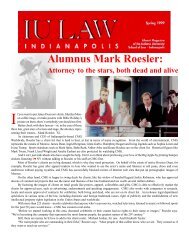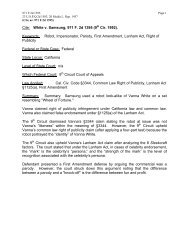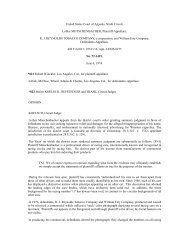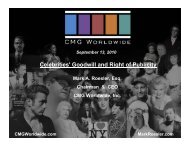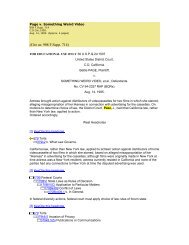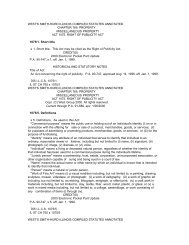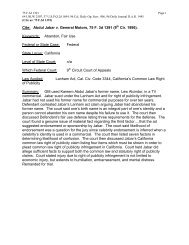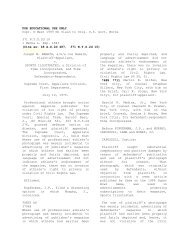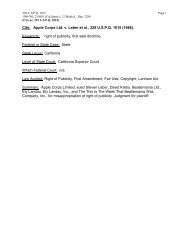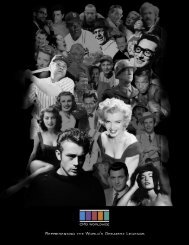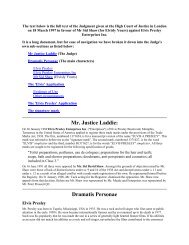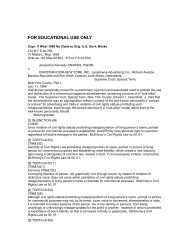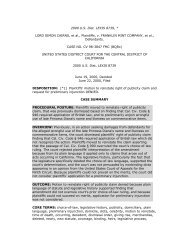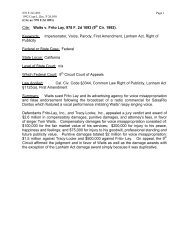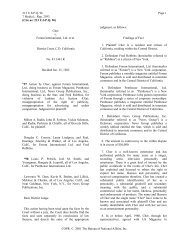Hustler v. Falwell.pdf - Mark Roesler
Hustler v. Falwell.pdf - Mark Roesler
Hustler v. Falwell.pdf - Mark Roesler
Create successful ePaper yourself
Turn your PDF publications into a flip-book with our unique Google optimized e-Paper software.
the Film's two central characters. Second, the screenplay establishes the<br />
reference to Rogers and Astaire as the basis for the Film's characters'<br />
livelihood and thereby recognizes the Rogers and Astaire phenomenon as a<br />
known<br />
element of modern culture.<br />
In addition, the record here establishes that the Film's satirical vision of<br />
television entertainment in the 1980's rests in part on the contrast provided by<br />
the old hoofers' imitation of Hollywood entertainment in a bygone era. The<br />
director's affidavit evinces Fellini's intent to evoke an American cultural<br />
symbol the existence of which Rogers concedes in her complaint. There is<br />
nothing<br />
in the record to suggest that Fellini intended to use Rogers' name to deceive<br />
the public into flocking to his movie under the mistaken belief that the Film<br />
was about the true Rogers and Astaire. Moreover, the critics' reviews uniformly<br />
acknowledge the Film's artistic tribute to Rogers and Astaire. Against the<br />
overwhelming evidence squarely placing the Film's [**25] title and screenplay<br />
within the realm of artistic expression, the fact that the Film's distributors<br />
may have conceived of and even executed a few schemes to exploit<br />
commercially<br />
the public's familiarity with Rogers' name does not turn either the film or its<br />
title into commercial speech. See Bolger v. Young Drug Prod., 463 U.S. at 67.<br />
Having determined that the speech in question is artistic expression, whether<br />
there were alternate avenues open to Fellini to convey his film's message is not<br />
subject to examination by this court. Because [*121] the speech at issue<br />
here is not primarily intended to serve a commercial purpose, the prohibitions<br />
of the Lanham Act do not apply, and the Film is entitled to the full scope of<br />
protection under the First Amendment.<br />
The State Law Claims<br />
Rogers' right of publicity claim rests on allegations of Defendants'<br />
unauthorized use of her name and public personality for advertising purposes or<br />
purposes of trade. See, e.g., Estate of Presley v. Russen, 513 F. Supp. 1339,<br />
1353 (D.N.J. 1981); Ali v. Playgirl, Inc., 447 F. Supp. 723, 728-29 (S.D.N.Y.<br />
1978). Defendants contend that this claim and Rogers' false light invasion of<br />
privacy claim are [**26] precluded by overriding constitutional concerns<br />
raised by the First Amendment's protection of artistic speech. n5<br />
- - - - - - - - - - - - - - - - - -Footnotes- - - - - - - - - - - - - - - - - -<br />
n5 Since, as discussed below, broad constitutional concerns, not narrow<br />
distinctions based on different states' laws, require dismissal of Rogers'<br />
claims, her attempt to raise a choice of law issue by arguing that the law of<br />
Oregon, her state of residence, rather than that of New York or California,<br />
governs her state law claims need not be addressed.<br />
- - - - - - - - - - - - - - - - -End Footnotes- - - - - - - - - - - - - - - - -<br />
PAGE 35<br />
695 F. Supp. 112, *121; 1988 U.S. Dist. LEXIS 8694, **26;<br />
8 U.S.P.Q.2D (BNA) 1562; 15 Media L. Rep. 2097<br />
Courts have been consistently unwilling to recognize the right of publicity<br />
cause of action where the plaintiff's name or picture was used in connection



